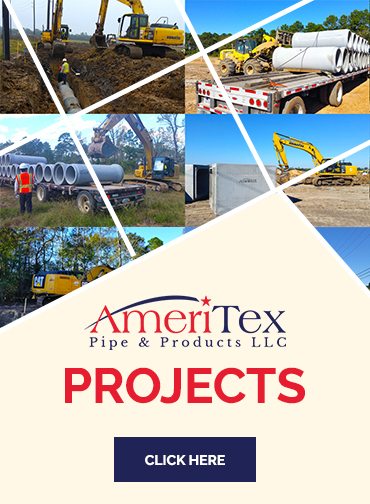What Is Concrete Pipe Testing, and When Do You Need It?
Posted on April 21, 2022
Reinforced concrete pipe is a highly durable, effective, and sustainable choice for utility infrastructure projects. RCP, as it’s often called, is commonly used for storm drains, sewer systems, culverts, irrigation, and a variety of other applications, depending on the exact reinforced concrete pipe dimensions and features.
It’s easy enough to get an answer to the question, “why concrete pipe?” But what do you need to know about the process of concrete pipe testing? Below, we’ll discuss what concrete pipe testing is and the various types of concrete pipe tests.
What is concrete pipe testing?
As the name suggests, concrete pipe testing involves testing the suitability and integrity of reinforced concrete pipe. These tests are carried out with a dedicated concrete pipe testing machine.
Concrete pipe testing standards are defined in several documents:
- ASTM International has published the document ASTM C-497, titled “Standard Test Methods For Concrete Pipe, Manhole Sections, Or Tile.” (The full ASTM C497 PDF is available for download from the ASTM International website.)
- Various other ASTM documents define specific types of concrete pipe testing standards. These include:
- ASTM C969, “Standard Practices for Infiltration and Exfiltration Testing of Installed Precast Concrete Pipe Sewer Lines”
- ASTM C1103, “Standard Practice for Joint Acceptance Testing of Installed Precast Concrete Pipe Sewer Lines”
- ASTM C1214, “Standard Test Method for Concrete Pipe Sewer lines by Negative Air Pressure (Vacuum) Test Method”
In the next section, we’ll go into more detail about the different kinds of concrete pipe tests.
What kinds of concrete pipe tests are available?
Various concrete pipe tests are used to ensure that the pipe meets the minimum physical requirements as defined by the ASTM standards. These tests include:
- Load testing: Concrete pipe load testing determines that the pipe is structurally adequate and can continue to perform under heavy loads. In a D-Load test of concrete pipe, the pipe’s supporting strength is assessed using a three-edge bearing test. The pipe is supported on two parallel strips. Force is then applied through a beam on top of the pipe.
- Pressure testing: Concrete pipe pressure testing verifies that the pipe can withstand a minimum pressure. In the negative air pressure testing method, the pipe is plugged at both ends and air is removed to create an environment of -3.5 psig (pounds per square inch gauge). The amount of leakage is calculated based on the time it takes to reach a pressure of -2.5 psig.
- Thickness testing: Concrete pipe thickness testing ensures that the pipe’s walls are adequately thick according to manufacturing specifications. This criterion can be tested with multiple methods, including physical inspection with calipers and ultrasonic equipment.
- Infiltration and exfiltration testing: Concrete pipe infiltration and exfiltration testing checks the amount of liquid seeping into (infiltration) or out of (exfiltration) the pipe. The exfiltration test procedure is carried out by filling the pipe with water and measuring the amount of leakage.
- Joint testing: Concrete pipe joint testing confirms that the joints connecting multiple concrete pipes are secure. A concrete pipe joint tester machine is used to check the pressure at each joint during pipe installation, catching any problems.
In addition to testing concrete pipes themselves, concrete pipe manufacturers may also wish to perform concrete pump pipe testing, ensuring that their concrete pumps are in working order.
When do you need concrete pipe testing?
Concrete pipe testing should be executed regularly to verify pipes’ structural integrity. There are essentially two points at which concrete pipe testing is conducted:
- Factory testing: Concrete pipe manufacturers need to conduct quality control tests on a random sample of their products. This demonstrates the manufacturer’s consistent and effective output, resulting in durable and structurally sound concrete pipes.
- Field testing: Concrete pipe testing may also be conducted during a construction project. Pipes may be tested before and after backfilling to ensure that no errors occur during the construction process. After installation, pipes may also be inspected on a recurring schedule to confirm that they continue to meet specifications.
How to get started with concrete pipe testing
Any reinforced concrete pipe used in construction and infrastructure projects must go through a thorough concrete pipe testing process. Make sure that your choice of concrete pipe manufacturer is committed to concrete pipe testing, which is crucial to ensuring the safety of workers and communities.
AmeriTex Pipe & Products is a leading supplier of reinforced concrete pipe, reinforced concrete box, and reinforced arch pipe in Texas, with Seguin, Conroe, and Dallas locations. If you need concrete pipe solutions, we’re here to help. Get in touch with our team today to discuss your project needs and objectives.
You can also check out our website for the latest news and updates.


